Methods
Session: Poster Session C
(177) Validated case-identifying algorithms using Canadian administrative health data: a targeted literature review
Wednesday, August 28, 2024
8:00 AM - 1:30 PM CEST
Location: Convention Hall II

- MT
Maria G. Tinajero
Broadstreet HEOR, Canada
- AB
Alexa C. Bowie, MPH
Broadstreet HEOR, Canada

Christina Qian, MSc (she/her/hers)
Director
Broadstreet HEOR, Canada
Co-Author(s)
Presenting Author(s)
Background: Case-identifying algorithms are necessary for real-world evidence studies, as they allow for efficient and accurate identification of relevant exposure, covariates, and outcomes within large administrative claims data. Although they exist in abundance in the scientific literature, the process of identifying specific validated algorithms is often tedious and time-consuming. A centralized resource to support the identification of validated algorithms would be helpful in streamlining future real-world research.
Objectives: To conduct a targeted literature review (TLR) to identify and summarize published, validated case-identifying algorithms developed using Canadian health administrative claims data.
Methods: In October 2023, a search was implemented in the Ovid MEDLINE, PubMed, and Canadian administrative health databases. Abstracts and full texts were screened by three independent reviewers and were included if they were published in the English language, used Canadian claims data, and estimated ≥1 algorithm performance measures of sensitivity, specificity, positive predictive value, or negative predictive value. Study and algorithm details were extracted, and studies were categorized by individual disease areas based on the list of chronic diseases included in the Canadian Community Health Survey (CCHS).
Results: A total of 272 studies were identified, of which 91 met the eligibility criteria and were summarized in this TLR. The majority of the studies were based in the province of Ontario (61.5%), followed by Manitoba (12.1%), and the majority (62.6%) were published within the last decade (post-2015). The studies identified in this TLR covered 20 (52.6%) of the 38 chronic conditions, covering common cardiovascular (10/91; 11%), metabolic (7/91; 7.7%), neurologic (8/91; 8.8%), and respiratory conditions (7/91; 7.7%). Common gaps were observed in musculoskeletal, ophthalmology, and certain mental health conditions.
Conclusions: This study showed good coverage of Canadian-specific case identifying algorithms for common chronic and neurologic conditions. The consolidated findings of the case algorithms identified through this TLR will be made publicly available as a resource in improving both validity and efficiency of future real-world evidence generation. Generalizability of the summarized algorithms beyond the Canadian context may be require additional validation due to region-specific variations in diagnosis coding.
Objectives: To conduct a targeted literature review (TLR) to identify and summarize published, validated case-identifying algorithms developed using Canadian health administrative claims data.
Methods: In October 2023, a search was implemented in the Ovid MEDLINE, PubMed, and Canadian administrative health databases. Abstracts and full texts were screened by three independent reviewers and were included if they were published in the English language, used Canadian claims data, and estimated ≥1 algorithm performance measures of sensitivity, specificity, positive predictive value, or negative predictive value. Study and algorithm details were extracted, and studies were categorized by individual disease areas based on the list of chronic diseases included in the Canadian Community Health Survey (CCHS).
Results: A total of 272 studies were identified, of which 91 met the eligibility criteria and were summarized in this TLR. The majority of the studies were based in the province of Ontario (61.5%), followed by Manitoba (12.1%), and the majority (62.6%) were published within the last decade (post-2015). The studies identified in this TLR covered 20 (52.6%) of the 38 chronic conditions, covering common cardiovascular (10/91; 11%), metabolic (7/91; 7.7%), neurologic (8/91; 8.8%), and respiratory conditions (7/91; 7.7%). Common gaps were observed in musculoskeletal, ophthalmology, and certain mental health conditions.
Conclusions: This study showed good coverage of Canadian-specific case identifying algorithms for common chronic and neurologic conditions. The consolidated findings of the case algorithms identified through this TLR will be made publicly available as a resource in improving both validity and efficiency of future real-world evidence generation. Generalizability of the summarized algorithms beyond the Canadian context may be require additional validation due to region-specific variations in diagnosis coding.
